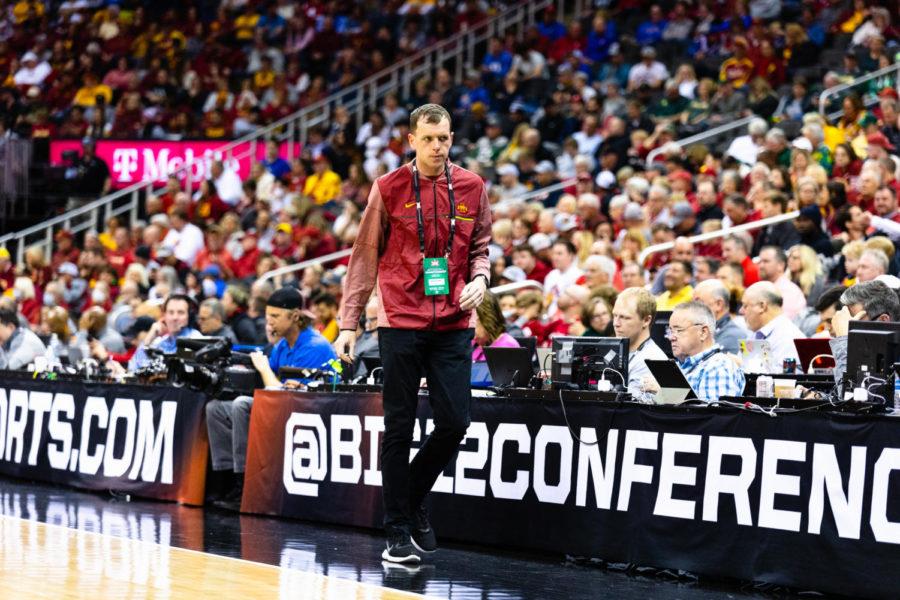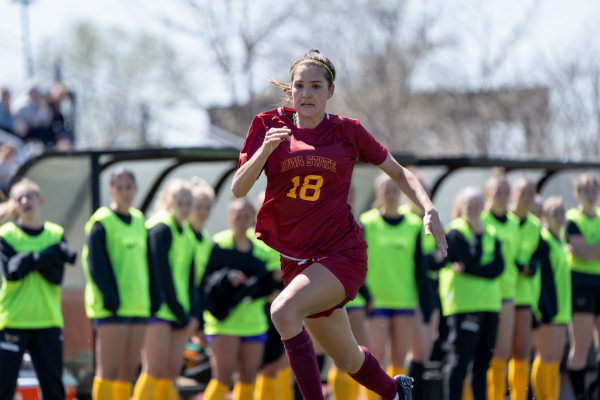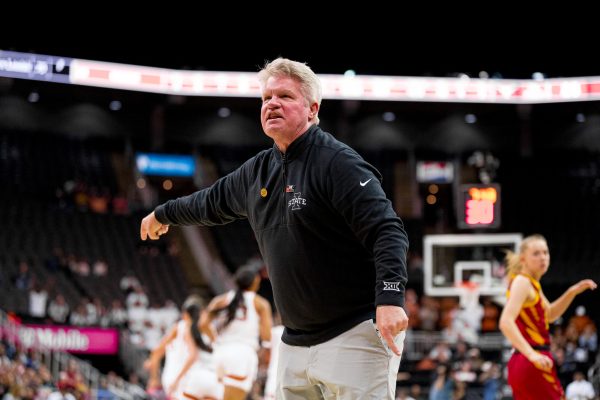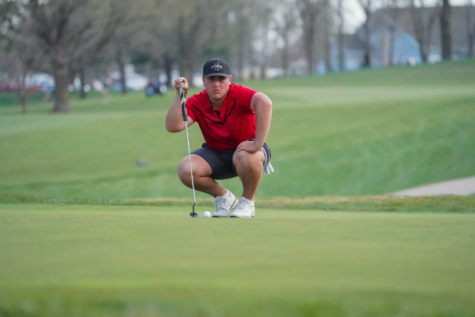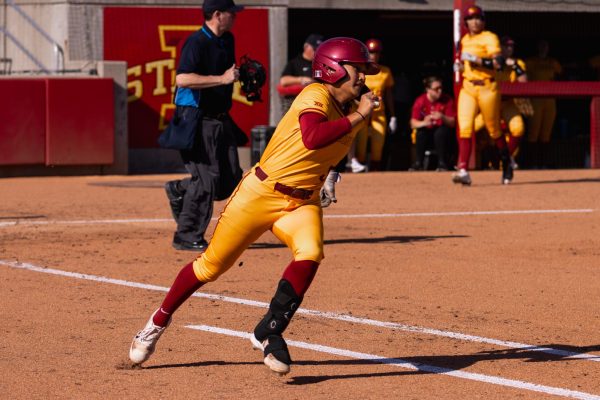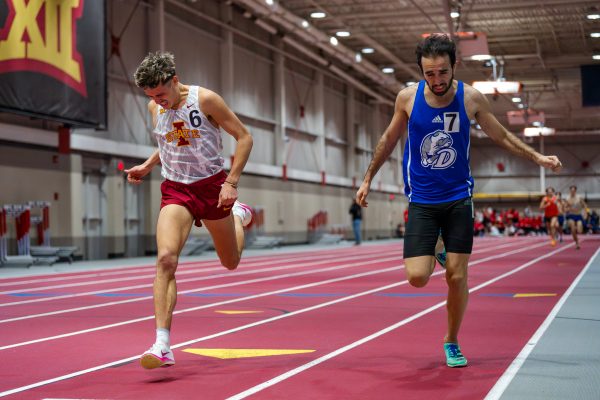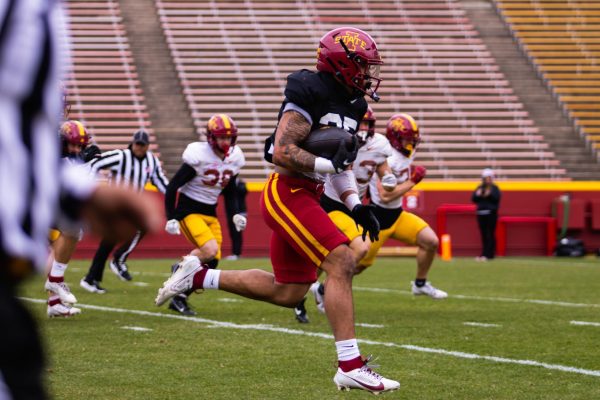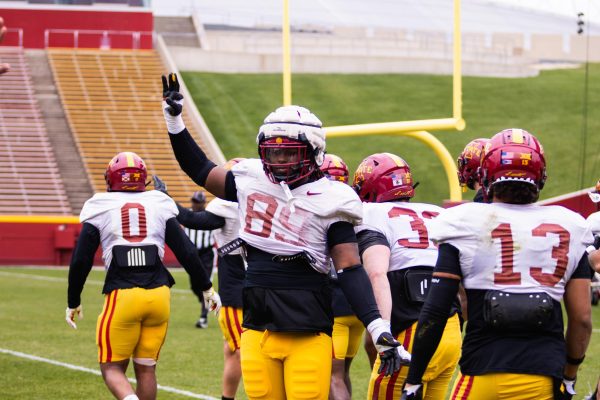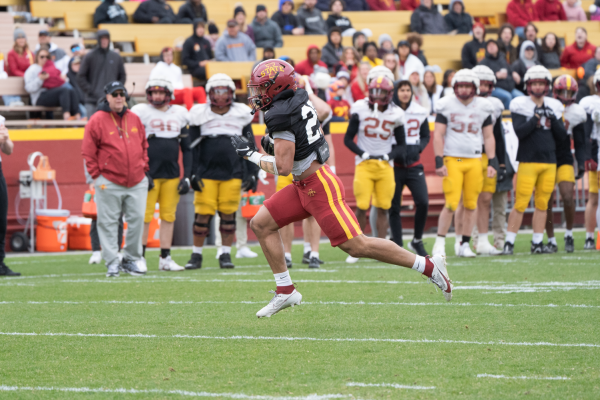Hidden Heroes: Patrick Tarbox
Collin Maguire/Iowa State Daily
Patrick Tarbox walks the sideline during the Big 12 Men’s Basketball Championship quarterfinal against Texas Tech on March 10th, 2022.
April 4, 2022
For Patrick Tarbox, sports are a passion. And as the assistant director of athletic communications for Iowa State, he’s found a career that allows him to channel that passion into meaningful work.
If you’ve read any press releases or team information from Iowa State Athletics regarding gymnastics, volleyball or track and field in the past eight years, it probably came from him.
If you’ve seen a release that helped you understand the historical context of any given match or achievement in those sports, it probably came from him.
Whether it’s traveling with the basketball programs during March Madness or the years he spent calling gymnastics and softball for Cyclones.tv, Tarbox’s commitment to Iowa State has set him apart as a steady figure in Iowa State Athletics.
This commitment and connection started back when he was still just a student at Iowa State, looking for a way to get involved in the sports communications world.
Now, 14 years after his freshman year and 14 years into the work that he is so passionate about, the man who simply goes by “Box” is deeply involved into what goes on behind the scenes in Iowa State Athletics.
‘An opportunity to help give back’
Mike Green, the Director of Traditions/Alumni Relations specialist at the Student-Athlete and Letterwinner Engagement office, worked in the athletic communications department at Iowa State since 1995.
Before Green’s recent job change, he acted as Tarbox’s boss in the Iowa State Athletics Communications department, with the two’s relationship dating back to 2008 when Tarbox was just a student starting out at Iowa State.
Tarbox had two lanes he used to get a job at Iowa State.
His high school football coach got him connected with a representative at the football offices at Iowa State and someone then recommended a place that was more fitting for him, which was the communications office.
It was an opportunity that he took and ran with.
“Even back then, you saw the passion that he had,” Green said. “The willingness to help and assist with anything at any time, and you knew he would be really good at this job. It was like a no-brainer. When he was a student we encouraged him, ‘you’d be really good at this if you wanna do it, and we’ll help you in any way possible to get you where you wanna go.’”
Green was the sports information director for men’s basketball back then, and he had Tarbox help him every game. He was someone who was reliable and did good work, and because of how advanced he was in his work, he was often counted on to do things that wouldn’t be assigned to most students.
Eventually, the promise was kept in helping Tarbox get where he wanted to go. After graduating in 2012, the athletic communications office helped him get a job as a graduate assistant in athletics media relations at TCU.
Staying there for a year from 2012-13, an opportunity to come back to Iowa State arose not that long after he had left Ames.
When Green took over the office in 2013, two full-time positions were open. Tarbox was one of the first people Green called, even though he had one more year at TCU if he wanted to use it.
“I called him and I said, ‘You need to apply, we’d love to have you back,’ and he did,” Green said. “So, I hired him full-time.”
For Tarbox, though, the decision was inspired by something deeper than just wanting full-time work.
It wasn’t seen just as a career advancer, but also as an opportunity to repay Iowa State and the athletics communications office for all that had been done for him in his four years there.
The relationships that he had built way back in 2008 resulted in a job that he has now held for nearly a decade, and a continuation of the work that he’s been doing for 14 years up to this point.
“The opportunity for a full-time job against a graduate assistant position is, I mean, for a career decision that was a big step up for me,” Tarbox said. “Personally, I felt an opportunity to help give back to Iowa State for what they gave to me. I did work hard to get to where I was, but I was also very fortunate to have people who believed in me, stood up for me and that kind of stuff. To have an opportunity to work with some of those people again and start repaying them in whatever little ways I could was very attractive to me.”
The ‘walking sports encyclopedia’
Again, it’s not just a job for Tarbox.
He loves sports and probably knows more than most in the athletics department when it comes to the nitty-gritty in sports.
In the workplace, he can be trusted to work on any sport at any time of the year and know how to navigate the landscape while also knowing what he’s talking about.
“He can pitch in and help in pretty much any sport because he has so much knowledge in all the sports,” Green said. “I can’t tell you how valuable he has been this year for us. This was a very challenging year for our office, because we had times during the year where we were a person short. We all had to pitch in, and Patrick really stepped up to the plate in a lot of areas.”
Tarbox is praised by the respective coaches of the sports he works closest to.
Take Christy Johnson-Lynch, Iowa State’s head volleyball coach, who was also around when Tarbox was just a student. She’s grateful for the amount of knowledge he has regarding volleyball.
As his coworker, Johnson-Lynch feels that he really loves and appreciates the sport, and it shows in the work that he puts in. He knows what’s going on across the country, who the best players are, what each team is good at, upsets, coaching changes, you name it.
It’s not just something he keeps up on because it’s his job, but something he keeps up on because he enjoys it.
“He’s probably been called, by many people, ‘a walking sports encyclopedia,’” Johnson-Lynch said. “He knows about a lot of sports, and he knows the good players, how the game is played, he knows the stats. He just has a lot of information in that brain of his, so I know I’m not the only one who feels that way. It’s just cool when you work with someone that feels like they really care about the sport, and they really care about your program, too.”
Going to a diverse high school in Dowling Catholic in West Des Moines, and even serving as class president for one year, Tarbox had the opportunity to meet people from different backgrounds and different perspectives.
This impacted his approach to the sports world, as he enjoys taking the opportunity to learn and know different things about different sports.
John, Tarbox’s father, also played a big role in his son’s ever-expanding sports knowledge.
“Growing up, my dad always made sure I had a varied sports path in terms of what we watched and what we experienced,” Tarbox said. “It wasn’t like I came from one track, like I only played football and watched football. My dad has maybe missed one Drake Relays in the last 30 years. It’s just a way to, I guess, experience different things and meet different people.”
That varied sports path has had a significant impact in Patrick’s life, in more ways than simply being applied in his line of work.
Getting off the beaten path
With all of the work that Tarbox puts in, it’s important to find ways to decompress and take some time off.
That’s where traveling comes in.
“He loves to travel, so we always try to encourage him, especially in the summer, to get out of here for a while,” Green said. “Just get away. He has been to Europe more than anyone that I have ever met.”
Green says that because of Tarbox’s incredible drive, he always wants to help out with every sport and every event, so much so that the boss has to tell him to take a day off and step away from work for a bit. That has resulted in seven trips to Europe for Tarbox.
The first was with the volleyball team in 2014.
Tarbox enjoyed his time there and decided he’d do it on his own in the future. One of the challenges he came across with taking those trips is learning to disconnect from what’s going on with work.
To do a good job in the athletics communications field you have to stay connected, and it’s hard for him to just flip that switch when he can go anywhere in the world and think about college sports.
If he really wants to flip that switch and give himself a break, he decided going to Europe was a good way to do it.
“It’s a good way to help decompress, unplug, get a breather,” Tarbox said. “It is hard. Especially in my position right now, it’s a long year. I’ll start doing volleyball stuff and get ready for the new season in the middle of July, and track season goes well into June. It’s hard to find breaks in there in between.”
“I might have two weeks in December every once in a while, sometimes a weekend pops up in the spring, but a lot of times those don’t.”
But he knows what he signed up for.
Doing this work for 14 years now, he understands the busy schedule that comes with it. That makes trips overseas that much more precious.
It’s something to work towards and look forward to. When buried in work, those trips can serve as a light at the end of the tunnel to make it through.
While on those trips, there is a particular way that Patrick likes to experience the world around him. Soccer is one of those various sports that he greatly appreciates, and when traveling around the world it is the most prominent and popular sport. “The beautiful game”, as it’s called, is something that can be bonded over no matter where you are.
“Wherever you are around the world, it’s something that you can compare and contrast,” Tarbox said. “A lot of places are different for whatever amount of reasons, but most of the places you go to have soccer. That’s a common bond within places that you can help base yourself in.”
That’s part of the reason why it’s known as “the beautiful game”. The ability to bring people together from all around the world is something that is unique to soccer, and the amount of people from all around the world who make up a single team and play together towards a common goal is something that you don’t get to see very often.
Outside of the aspects of the game itself, soccer has also provided opportunity to see new sights that aren’t typically considered tourist attractions. With some soccer stadiums being placed in unconventional areas, Patrick enjoys taking advantage of the opportunity to see new sights and new people.
“It gives you a good opportunity to get off the beaten path and see some of the different places around these big cities outside of their run-of-the-mill tourist places,” Tarbox said. “I think of Prague in the Czech Republic. It’s a place where their four soccer clubs are outside the city, which you would never go to because that’s not tourist stuff.
“It gives you an opportunity to go see the suburbs and go see the Jewish Quarter of Prague that other people wouldn’t go to otherwise. It’s a way of enhancing that experience a little more outside of just being like ‘oh, there’s Big Ben.’ No, now you have a reason to go south of the river in London.”
Back home, he walks everywhere.
The way he sees it, it’s good exercise and it’s a good way to keep experiencing the world around you. Johnson-Lynch says there’s times where the team will get back to Ames late at night, and someone will offer him a ride. That offer tends to be politely declined.
“I would be curious to know how many steps he’s getting in a day because he’s always going,” Johnson-Lynch said.
Molded by family
Anyone you talk to that knows Tarbox will speak about his work ethic.
“He works really, really hard, and he loves what he does,” Johnson-Lynch said. “He takes a lot of pride in it. That job and that profession is a bit of a thankless job. A lot of hours, kind of a grinding position. He does that really well. He’s not afraid to put in tons and tons of hours and juggle a lot of different responsibilities.”
Some people have to develop that work ethic as they get older, and others have it instilled in them at a very young age. For Tarbox, it was the latter.
Both his parents John and Joan helped to make him the person he is today.
Joan grew up on a farm, always waking up early and working hard. Tarbox believes that willingness to go the extra mile comes from her. His dad was also a hard worker, managing a store where he got his first job.
“My first job growing up, I got it the day I turned 14 at the grocery store my dad managed,” Tarbox said. “I really didn’t have to work that hard to get the job, it was like ‘get in here and fill out the application so we can hire you,’ but I grew up seeing how hard he worked and the hours he worked and what he did. That influenced me coming into this. I feel like I came in with a good work ethic and a willing to work anywhere, any place, any time kind of thing.”
In terms of personality, that comes from John.
Growing up in a big family that also served as a foster family, John lived in a house with upwards of 20 people. Being the middle child of his 12 brothers and sisters and being around people with different lives and perspectives helped him to balance out as a person.
Also known for his sense of humor, Tarbox has his own distinct style when it comes to cracking jokes. You may not get it right away, but if you’re using your active listening skills a laugh is sure to come up.
“He can be sarcastic and dry with it, so you kind of have to listen,” Johnson-Lynch said. “He’s a lot of fun to be around. I really enjoy working with him. You’ve gotta pay attention, because he’ll slip some things in there quietly. If you’re not paying attention, you wouldn’t appreciate the humor. He’s clever and smart, and he knows a lot. I’d probably wanna be on his team in any sort of trivia game because I think he’d have a really good shot at winning, especially anything to do with sports.”
In terms of any particular instances where Tarbox has flashed that sense of humor, well, use your imagination.
“The one that comes to mind I can’t really say in the paper,” Johnson-Lynch said with a smile.
‘The beauty of Box’
In all, Tarbox is just someone that can be counted on to do what needs to be done.
“He just delivers,” Green said. “That’s the thing. Content here, taking care of this there. I know the average fan probably doesn’t fully understand what we do, but when you think about all of the little things out there that you just know are always gonna be there, you maybe take for granted, they have no idea that we’re the ones probably giving them that information.”
Tarbox feels a responsibility to fans to provide that content.
His father is an Iowa State fan, so growing up he had a good understanding of Cyclone fans and their mentality. Now that he works for Iowa State, he sees on a day-to-day basis just how passionate those fans are and how much they want to support those teams.
Working in an office that’s smaller than other schools in the Big 12 means that everyone has to help each other out a little bit more. When someone like Tarbox is a part of that team, it becomes a whole lot easier to make things work.
“That’s the beauty of ‘Box:’ you can always count on him to help out with everything,” Green said. “He’s kind of our jack-of-all-trades. He’s so knowledgeable in so many different areas. We all have our strengths and weaknesses, and what makes ‘Box’ so valuable to us is he understands the statistical side, he understands the technology side, he’s really good at covering sports, he’s a good writer.”
“To use the old baseball term, he’s a five-tool sports information director.”
What goes on behind the scenes is imperative to everything involving Iowa State Athletics. Players don’t get awards if Box doesn’t turn things in. Recaps, graphics, social media updates, box scores, videos, photos and countless other processes are accessible because of Tarbox and people like him.
“You know, he’s not out on the floor,” Johnson-Lynch said. “They’re not announcing his name, but yet so many of these things have to be done in a really responsible way, in an accurate way, for us to kind of benefit from it. With all of those things he’s kept very busy. Many of the things he does I don’t think we even know. There’s jobs like that where you don’t even know who does the job, you just know it gets done. That’s what he does.”
Really, this is what he always wanted to do.
His mother kept basically everything from his life, and there’s writing from when he was very young that provides some foreshadowing of what was to come. Looking back now, it’s clear to him that this path was the one he was looking for.
“She’d read through these reports from when I was 9 or 10 years old and be like ‘oh look, you talked about how you wanted to work in sports and maybe write about it and learn some history. Look at what you do now. You kind of do all of that stuff.'”

